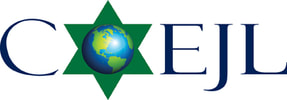|
We more or less know right from wrong, in general -- and regarding what we're doing to the biosphere, we are mostly clued in. Why then, even when we know better, do we keep making unsustainable, unjust, and ultimately unwise choices? Why the giant gap between our values and our actions? To be better aligned, we must first “mind the gap” -- notice it, focus on it, even feel bad about it -- then bridge the gap, and ultimately close it. Jewish tradition promotes a structure for this ongoing ethical-spiritual introspection and sustained self-improvement: Mussar. The world as a whole can use this, right now.
|
CategoriesAUthorRabbi Fred Scherlinder Dobb, an eco-Jewish teacher-writer-organizer for over three decades, is COEJL's new Rabbinic Consultant. Fred serves on the national board of Interfaith Power and Light, and remains active in Jewish and multifaith efforts toward justice and sustainability. Please reach out if he or others at COEJL can work with you in some way, raising eco-Jewish awareness and action. authorIsrael Harris (he/him), a community and advocacy organizer, is COEJL's new Advocacy Director, and NRPE's new Policy Director. As an educator and youth advocate, Israel also supports Reform youth at the URJ, and continues working in support of our Jewish, multifaith, and justice-focus communities striving for equity and sustainability. |
[email protected]
Coalition on the Environment and Jewish Life is a project of a consortium of Jewish agencies, alongside allies, under the umbrella of the National Religious Partnership for the Environment.
In-Person meetings, across from U.S. Capitol: co/ NRPE, 110 Maryland Ave. NE, Su 203 -- Washington DC 20002
Mailings/Checks: c/o NRPE, 2529 Holkham Drive, Charlottesville, VA 22901
Coalition on the Environment and Jewish Life is a project of a consortium of Jewish agencies, alongside allies, under the umbrella of the National Religious Partnership for the Environment.
In-Person meetings, across from U.S. Capitol: co/ NRPE, 110 Maryland Ave. NE, Su 203 -- Washington DC 20002
Mailings/Checks: c/o NRPE, 2529 Holkham Drive, Charlottesville, VA 22901
